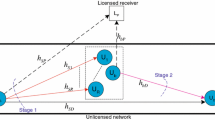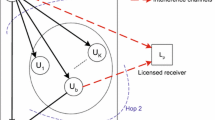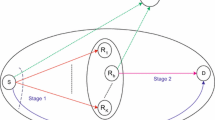Abstract
This paper analyzes outage performance of opportunistic relay selection in cognitive radio networks with primary user’s interference and direct channel over independent non-identically distributed fading channels and under maximum transmit power constraint and interference power constraint. Exact analysis is firstly proposed and then extended to asymptotic analysis to have insights into important performance metrics such as coding gain and diversity order. The proposed analysis can also be applied to corresponding analysis for opportunistic relay selection in cognitive radio networks with PU’s interference and without direct channel to highlight the usefulness of direct channel in relaying communications without any sacrifice of power and bandwidth. A multitude of results illustrate an achievable full diversity order, a considerable system performance deterioration due to primary user’s interference but this deterioration can be drastically remedied by increasing the number of involved relays, and the superiority of opportunistic relay selection with direct channel to that without it.






Similar content being viewed by others
Notes
As will be shown in the next section, both PU’s interference and direct channel induce received SINRs to be correlated, making the analysis more complicated but more general and practical.
\(\mathcal {R}[j]\) denotes the jth element of the set \(\mathcal {R}\).
References
FCC: Spectrum policy task force report. ET Docket 02-135 (2002)
Mitola III, J. (2000). Cognitive radio: An integrated agent architecture for software defined radio, Royal Institute of Technology (KTH). Sweden
Goldsmith, A., Jafar, S. A., Maric, I., & Srinivasa, S. (2009). Breaking spectrum gridlock with cognitive radios: An information theoretic perspective. Proceedings of the IEEE, 97(5), 894–914.
Tran, H., Hagos, M. A., Mohamed, M., & Zepernick, H. J. (2013). Impact of primary networks on the performance of secondary networks. In Proceedings of IEEE ComManTel (pp. 43–48). HCM City, Vietnam.
Mokari, N., Parsaeefard, S., Saeedi, H., Azmi, P., & Hossain, E. (2015). Secure robust ergodic uplink resource allocation in relay-assisted cognitive radio networks. IEEE Transactions on Signal Processing, 63(2), 291–304.
Sibomana, L., Tran, H., Zepernick, H. J., & Kabiri, C. (2013) On non-zero secrecy capacity and outage probability of cognitive radio networks. In Proceedings of WPMC (pp. 1–6). New Jersey, USA.
Tran, H., Zepernick, H. J., & Thai, C. D. T. (2013). Outage performance of cognitive radio networks under outage constraint of multiple primary users and transmit power constraint of secondary user. In Proceedings of IEEE ICUFN (pp. 631–635). DaNang, Vietnam.
Kabiri, C., Zepernick, H. J., Sibomana, L., & Tran, H. (2013). On the performance of cognitive radio networks with DF relay assistance under primary outage constraint using SC and MRC. In Proceedings of IEEE ATC (pp. 12–17). HoChiMinh City, Vietnam.
Si, J., Li, Z., Chen, X., Hao, B. J., & Liu, Z. J. (2011). On the performance of cognitive relay networks under primary user’s outage constraint. IEEE Communications Letters, 15(4), 422–424.
Tourki, K., Qaraqe, K. A., & Alouini, M. S. (2013). Outage analysis for underlay cognitive networks using incremental regenerative relaying. IEEE Transactions on Vehicular Technology, 62(2), 721–734.
Si, J., Li, Z., Huang, H., Chen, J., & Gao, R. (2012). Capacity analysis of cognitive relay networks with the PU’s interference. IEEE Communications Letters, 16(12), 2020–2023.
Bao, V. N. Q., & Duong, T. Q. (2012). Exact outage probability of cognitive underlay DF relay networks with best relay selection. IEICE Transactions on Communications, E95–B(6), 2169–2173.
Liping, L., Zhang, P., Zhang, G., & Qin, J. (2011). Outage performance for cognitive relay networks with underlay spectrum sharing. IEEE Communications Letters, 15(7), 710–712.
Yan, Z., Zhang, X., & Wang, W. (2011). Exact outage performance of cognitive relay networks with maximum transmit power limits. IEEE Communications Letters, 15(12), 1317–1319.
Chen, Y., Ge, J., & Bu, Q. (2014). Outage and diversity analysis of cognitive relay networks with direct link under interference constraints over Nakagami-m fading. In Proceedings of IEEE CIT (pp. 88–93). Xi’an, Shaanxi, China.
Hong, J. P., Hong, B., Ban, T. W., & Choi, W. (2012). On the cooperative diversity gain in underlay cognitive radio systems. IEEE Transactions on Communications, 60(1), 209–219.
Hanif, M., Yang, H. C., & Alouini, M. S. (2015). Receive antenna selection for underlay cognitive radio with instantaneous interference constraint. IEEE Signal Processing Letters, 22(6), 738–742.
Lee, J., Wang, H., Andrews, J. G., & Hong, D. (2011). Outage probability of cognitive relay networks with interference constraints. IEEE Transactions on Wireless Communications, 10(2), 390–395.
Ha, D. B., Vu, T. T., Duy, T. T., & Bao, V. N. Q. (2015). Secure cognitive reactive decode-and-forward relay networks: With and without eavesdropper. Wireless Personal Communications, 85(4), 2619–2641.
Nosratinia, A., Hunter, T. E., & Hedayat, A. (2004). Cooperative communication in wireless networks. IEEE Communications Magazine, 42, 74–80.
Laneman, J. N., Tse, D. N. C., & Wornell, G. W. (2004). Cooperative diversity in wireless networks: Efficient protocols and outage behavior. IEEE Transactions on Information Theory, 50(12), 3062–3080.
Bletsas, A., Khisti, A., Reed, D. P., & Lippman, A. (2006). Simple cooperative diversity method based on network path selection. IEEE Journal on Selected Areas in Communications, 24(3), 659–672.
Zhong, B., Zhang, Z., Zhang, X., Wang, J., & Long, K. (2013). Partial relay selection with fixed-gain relays and outdated CSI in underlay cognitive networks. IEEE Transactions on Vehicular Technology, 62(9), 4696–4701.
Chen, J., Si, J., Li, Z., & Huang, H. (2012). On the performance of spectrum sharing cognitive relay networks with imperfect CSI. IEEE Communications Letters, 16, 1002–1005.
Minghua, X., & Aissa, S. (2012). Cooperative AF relaying in spectrum-sharing systems: Outage probability analysis under co-channel interferences and relay selection. IEEE Transactions on Communications, 60(11), 3252–3262.
Zhong, B., Zhang, X., Li, Y., Zhang, Z., & Long, K. (2013). Impact of partial relay selection on the capacity of communications systems with outdated CSI and adaptive transmission techniques. In Proceedings of IEEE WCNC (pp. 3720–3725). Shanghai, China.
Seyfi, M., Muhaidat, S., & Liang, J. (2013). Relay selection in cognitive radio networks with interference constraints. IET Communications, 7(10), 922–930.
Sharma, P. K., Solanki, S., & Upadhyay, P. (2015). Outage analysis of cognitive opportunistic relay networks with direct link in Nakagami-m fading. IEEE Communications Letters, 19(5), 875–878.
Kim, K. J., Duong, T. Q., & Tran, X. N. (2012). Performance analysis of cognitive spectrum-sharing single-carrier systems with relay selection. IEEE Transactions on Signal Processing, 60(12), 6435–6449.
Chamkhia, H., Hasna, M. O., Hamila, R., & Hussain, S. I. (2012). Performance analysis of relay selection schemes in underlay cognitive networks with decode and forward relaying. In Proceedings of IEEE PIMRC (pp. 1552–1558). Sydney, Australia.
Giang, N. H., Bao, V. N. Q., & Le, H. N. (2013). Cognitive underlay communications with imperfect CSI: Network design and performance analysis. In Proceedings of IEEE ATC (pp. 18–22). HoChiMinh City, Vietnam.
Si, J., Huang, H., Li, Z., Hao, B., & Gao, R. (2014). Performance analysis of adaptive modulation in cognitive relay network with cooperative spectrum sensing. IEEE Transactions on Communications, 62(7), 2198–2211.
Guimaraes, F. R. V., da Costa, D. B., Tsiftsis, T. A., Cavalcante, C. C., & Karagiannidis, G. K. (2014). Multi-user and multi-relay cognitive radio networks under spectrum sharing constraints. IEEE Transactions on Vehicular Technology, 63(1), 433–439.
Asaduzzaman, Kong, H. Y., & Lyum, K. (2010). Cooperative relaying in interference limited cognitive radio networks. In Proceedings of IEEE WiMob (pp. 280–285). Niagara Falls, Canada.
Guimaraes, F. R. V., da Costa, D. B., Benjillali, M., Tsiftsis, T. A., & Karagiannidis, G. K. (2013). Best relay selection in cooperative spectrum sharing systems with multiple primary users. In Proceedings of IEEE (pp. 2661–2665). Budapest, Hungary.
Zhang, Y., Xie, Y., Liu, Y., Feng, Z., Zhang, P., & Wei, Z. (2012). Outage probability of cognitive relay network with transmit power and interference constraints. In Proceedings of WPMC (pp. 1–5). Taipei, Taiwan.
Tourki, K., Qaraqe, K. A., & Abdallah, M. (2014). Outage analysis of incremental opportunistic regenerative relaying with outdated CSI under spectrum sharing constraints. In Proceedings of IEEE WCNC (pp. 851–856). Istanbul, Turkey.
Sakran, H., Shokair, M., Nasr, O., El-Rabaie, S., & El-Azm, A. A. (2012). Proposed relay selection scheme for physical layer security in cognitive radio networks. IET Communications, 6(16), 2676–2687.
Chang, C. W., Lin, P. H., & Su, S. L. (2011). A low-interference relay selection for decode-and-forward cooperative network in underlay cognitive radio. In Proceedings of IEEE CROWNCOM (pp. 306–310). Osaka, Japan.
Thanh, T. L., Bao, V. N. Q., & An, B. (2013). On the performance of outage probability in underlay cognitive radio with imperfect CSI. In Proceedings of IEEE ATC (pp. 125–130). HoChiMinh City, Vietnam.
Wu, Q., Zhang, Z., & Wang, J. (2013). Outage analysis of cognitive relay networks with relay selection under imperfect CSI environment. IEEE Communications Letters, 17(7), 1297–1300.
Ding, H., Ge, J., da Costa, D. B., & Jiang, Z. (2011). Asymptotic analysis of cooperative diversity systems with relay selection in a spectrum-sharing scenario. IEEE Transactions on Vehicular Technology, 60, 457–472.
Zhang, X., Xing, J., Yan, Z., Gao, Y., & Wang, W. (2013). Outage performance study of cognitive relay networks with imperfect channel knowledge. IEEE Communications Letters, 17(1), 27–30.
Khuong, H. V., & Sofotasios, P. C. (2013). Exact bit-error-rate analysis of underlay decode-and-forward multi-hop cognitive networks with estimation errors. IET Communications, 7(18), 2122–2132.
Khuong, H. V. (2013). Exact outage analysis of underlay cooperative cognitive networks with maximum transmit-and-interference power constraints and erroneous channel information. Transactions on Emerging Telecommunications Technologies, 24(7–8), 1–17.
Bao, V. N. Q., Duong, T. Q., & Chintha, T. (2013). On the performance of cognitive underlay multihop networks with imperfect channel state information. IEEE Transactions on Communications, 61(12), 4864–4873.
Khuong, H. V. (2014). Impact of imperfect channel information on the performance of underlay cognitive DF multi-hop systems. Wireless Personal Communications, 74(2), 487–498.
Vucetic, B., & Yuan, J. (2003). Space-time coding. New York: Wiley.
Gradshteyn, I. S., & Ryzhik, I. M. (2000). Table of integrals, series and products (6th ed.). San Diego, CA: Academic Press.
Goldsmith, A. (2005). Wireless communications. Cambridge: Cambridge Universtiy Press.
Acknowledgments
This research is funded by Vietnam National Foundation for Science and Technology Development (NAFOSTED) Under Grant Number 102.04-2014.42
Author information
Authors and Affiliations
Corresponding author
Rights and permissions
About this article
Cite this article
Ho-Van, K., Pham-Hong, L., Vo-Que, S. et al. On the Performance of Opportunistic Relay Selection in Cognitive Radio Networks with Primary User’s Interference and Direct Channel. Wireless Pers Commun 91, 345–367 (2016). https://doi.org/10.1007/s11277-016-3464-9
Published:
Issue Date:
DOI: https://doi.org/10.1007/s11277-016-3464-9




